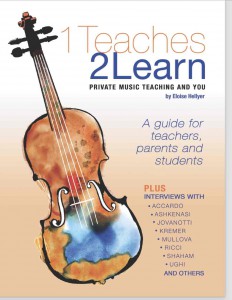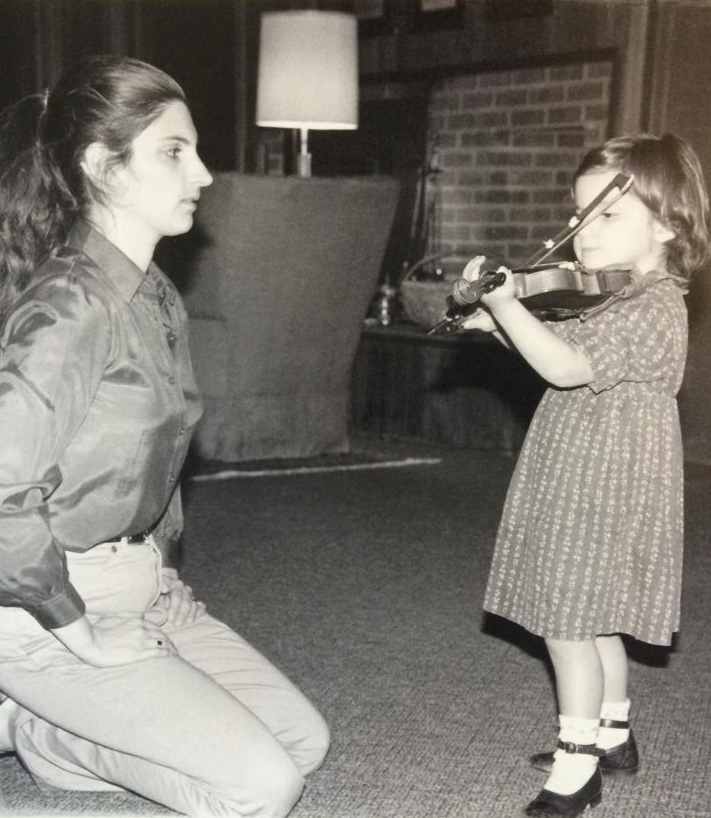Who’s in Charge?
The biggest problem most parents face with music training is getting their children to practice. Some of my colleagues have invented systems for making practice fun which is laudable and I heartily approve. But the very fact that there is a need for this means that practice is inherently NOT fun and has to be made palatable. However, no matter how wonderful and enjoyable these systems are, there will still be times when a child will not want to practice. Not just the typical “I want to go play with my friends instead,” but a fairly constant lack of cooperation or out-and-out resistance to doing even a small amount of practice. Parents can try new methods or call the teacher for advice but in my experience, it always boils down to one thing – is the child going to do what the parent says or not? Who’s in charge?
I have many parents who tell me, “You don’t know what he does to me at home!” (Oh, yes I do – I have two violinist daughters, remember?) My answer to these parents is always the same: is your child going to do what you say or not. Who is in charge?
This is a decision that a parent has to make. If you feel that children should make their own decisions, then music lessons are probably not for you and your young one. If, however, you decide that your child is going to study music as an important part of his education, I offer a Very Important Observation:
When there is a problem with practicing, the real question is rarely whether the child wants to play the instrument or not (no matter what he says at the moment), but if he is willing to do what the parent says.
Therefore, if we are convinced that we parents can do a better job than our children in deciding what is good for them, somebody has to run the show. Who’s in charge?
Those who complain that their children refuse to practice or practice well often confess that these children also resist doing any other task required of them, meaning they are not particularly obedient or compliant about anything.
But here’s the big difference: when a child doesn’t want to do his homework, his parents do not make frantic phone calls to his schoolteacher. When a child doesn’t want to do his household chores, they don’t call a psychologist. When a child resists going to catechism they don’t ask for help from the priest. The problem is just dealt with. Why then do parents get so upset when their children don’t want to practice their musical instruments? Why do I find myself counseling anxious parents on this problem with after hours phone calls?
The answer is that many parents feel that music training does not fall into the category of discipline like school work, chores, religious training, exercise, etc., but into the category of passion, like falling in love. Whereas parents may have no scruples about making a child do any of the tasks listed above, they often feel that passion for music or love for the instrument should make practicing easy and pleasurable for the child.
Yes, love conquers all, but as anyone who has been in a long term relationship can tell you, love can vacillate. Sometimes you love your partner more, sometimes a little less, and sometimes a LOT less. The love that you know is there (even if it doesn’t seem apparent), self-discipline and a bit of wisdom are what tide us over in difficult moments, but can we seriously expect young children to know this? Discipline and routine keep adults going. Children, however, usually don’t have either, so they must be imposed. Who’s in charge?
Yes, love conquers all but first it must be cultivated. As any mother can tell you, taking care of your children is what develops your parental love for them. As happily married couples can tell you, love at first sight may occur but it is being together, taking care of each other and working together that are essential to continuing love and a strong relationship, and you should expect to have some difficulties or even some unpleasantness along the way. Unless a music student is born wise, passionate and disciplined he won’t become aware of any of this or develop any of these qualities unless his parents make him practice and thus help him to cultivate his relationship with his instrument and with music in general.
So, parents, take heart! Applying discipline to your children when they are too immature to apply it to themselves is one of greatest gifts you can bestow on them. It takes lots of energy, time and conviction on your part. If you remember, however, to think of music training as just another discipline you impose on your children, it will become a lot easier. Just keep asking yourself: who’s in charge?
Share this:
Buy it on www.sharmusic.com - eBook format, avaliable worldwide, paperback in North America
COPYRIGHT
ABOUT
A music teacher’s thoughts and observations on the teaching and the study of a musical instrument, hoping to be of help to parents, students and teachers.
PHOTO
AWARDED TOP 25 VIOLIN BLOG
CATEGORIES
TAGS
ARCHIVES
-
Agosto 2022
Agosto 2023
Agosto 2024
April 2015
April 2016
April 2017
April 2019
April 2020
Aprile 2022
Aprile 2023
Aprile 2024
August 2014
August 2015
August 2016
August 2017
August 2018
August 2019
August 2021
December 2014
December 2015
December 2016
December 2017
December 2018
December 2019
December 2020
Dicembre 2022
Dicembre 2023
Dicembre 2024
Febbraio 2022
Febbraio 2023
Febbraio 2024
February 2015
February 2016
February 2018
February 2019
February 2020
February 2021
Gennaio 2022
Gennaio 2023
Gennaio 2024
Giugno 2022
Giugno 2022
Giugno 2023
Giugno 2024
January 2015
January 2016
January 2017
January 2018
January 2019
January 2020
July 2015
July 2017
July 2019
June 2016
June 2017
June 2018
June 2019
June 2020
June 2021
Luglio 2022
Luglio 2023
Luglio 2024
Maggio 2022
Maggio 2023
Maggio 2024
March 2015
March 2016
March 2017
March 2018
March 2019
March 2020
March 2021
Marzo 2022
Marzo 2023
Marzo 2024
May 2015
May 2016
May 2018
May 2019
May 2020
November 2014
November 2015
November 2016
November 2017
November 2018
November 2019
November 2021
Novembre 2022
Novembre 2023
Novembre 2024
October 2014
October 2015
October 2017
October 2018
October 2019
October 2020
October 2021
Ottobre 2022
Ottobre 2023
Ottobre 2024
September 2014
September 2015
September 2016
September 2018
September 2019
September 2020
September 2021
Settembre 2022
Settembre 2023
Settembre 2024
RECENT POSTS
Terry G and Me, or Terry Gilliam on Where (or What) Practicing the Piano Will Get You…
The Teaching We Don’t Do Is More Important Than We Think
Overwhelmingness or What Teaching and Motherhood* Have in Common
Cellphone Serenity
How to Build Your Reputation – the Kind You Want
Desperate Times, Desperate Measures. Or How to Deal With Your Strong-Willed Stubborn Student and Survive
“Why Does My Teacher Get So Frustrated?” Letter to a Perplexed Student
Mount Rush-no-more….And How to Get There
Realizzato con VelociBuilder - Another Project By: Marketing:Start! - Privacy Policy




